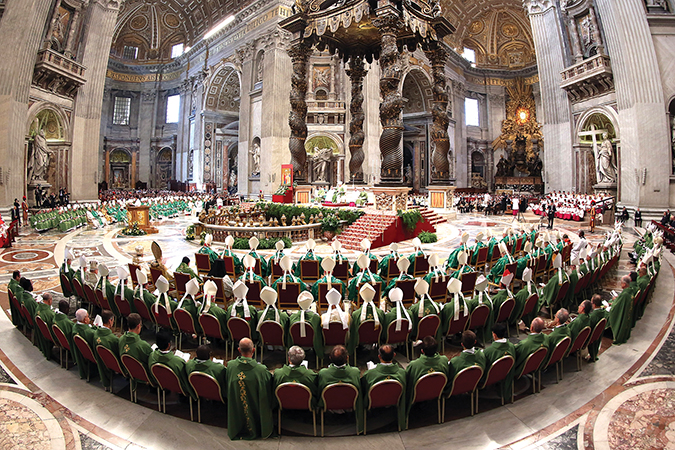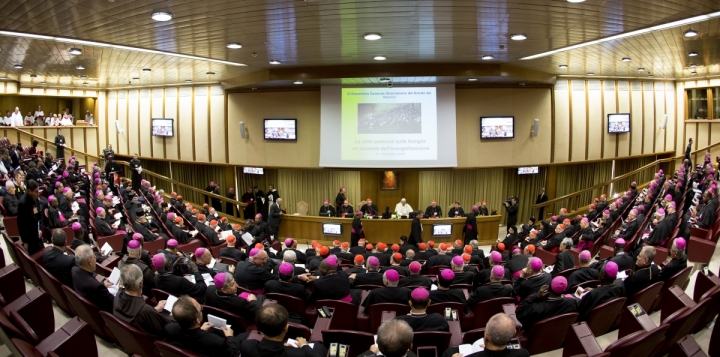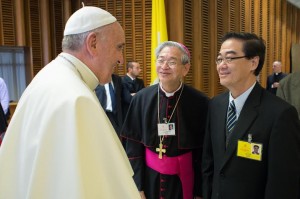“A disciple is not above the teacher, nor a slave above the master“ [Matthew 10:24, NRSV].
 Extraordinary Synod on the Family Opening Mass at St. Peter’s Basilica 5 Oct. 2014.
Extraordinary Synod on the Family Opening Mass at St. Peter’s Basilica 5 Oct. 2014.
Right after the Extraordinary Synod on the Family held in the Vatican City October 5-19, which I attended as an adiutor, I headed straight to New Zealand to meet up with friends from USA and Malaysia and enroute joined by Angie in Singapore. It was a delightful and gifted time of reunion and leisurely discussions in the midst of the scenic beauty of the South Island of Kiwi land. It all has to do with ‘family’ matters of course – the ecclesial family called into existence as a faith community by the Spirit of Christ. But why New Zealand? That’s where our daughter Elena resides, and where we rushed to see her 7-month old baby girl, Sophia, a most delightful little bundle of joyful gift from God. And we made sure we arrived in time for her christianing. Now, that’s family matters as well, and of a kind closely connected with this Synod on the Family which for some time now has been the buzz around the globe.
On hearing of my visit to Christchurch from some of his parishioners who knew me and knew of my participation at the Synod on the Family, the Rector of the Church of Our Lady of Victories, Fr. Michael Pui, requested that I address his parishioners after Sunday Liturgy, sharing my experience at the Synod and taking questions. With all that media-hype on so-called “hot-button” issues, some questions understandably gravitated around “controversial” topics. Concerning these issues, what I have repeatedly discovered is that a combination of media spins and positions passionately held often leads to much confusion. In sharing my experience at the Synod, therefore, I have basically tried to wrap my mind around three points.
1. Journeying
The term ‘synod’ combines two Greek words: “syn” for together, and “hodos” for way, to mean “together on the way”, thus pointing to “journeying together”. A synodal process is a profound walk together by the family of God, a pilgrim people journeying towards the Creator, sharing their lives, their thoughts and their experiences. It is not only a metaphor for collegiality; it is collegiality in concrete reality. Synods are collegiality-in-action and involve a process of mutual engaging, discerning and discovering.
There are in the Catholic Church two common types of synod: one is the diocesan synod (called by the local Ordinary – the bishop in charge of the diocese), and the other is the pontifical synod (called by the Pope). In the latter case, it rests on every local bishop to open the synodal process as extensively as he wishes so as to meaningfully include the laity – that tremendous majority of the People of God – in meaningful collegiality of the family of God.
The pontifical synodal process begins with a questionnaire – the lineamenta. Written in preparation for discussions by a General Assembly of the Synod of Bishops, it is intended for use by bishops to invite the participation of all in the Church so that they can enter into discussion and take a pastoral inventory. The responses from the dioceses of the world to the lineamenta are collated and compiled into a working paper – the instrumentum laboris. At the synod hall, the Synod Fathers discuss this working paper in detail, first in general assembly and then in small language-groups. At the end of the synod, a report is drawn up and propositions are presented to the Holy Father who may then decide to issue an Apostolic Exhortation. It is well to remember that the Pope may call a teaching synod or a pastoral synod.
To give greater flesh to this collegial synodal process, Pope Francis opened two areas for active participation by the laity. First, for the first time that I can remember, the laity were invited to take part in responding to the lineamenta, while the bishops of the world were directed to seek as wide a participation as possible. Second, married couples were invited to attend this Extraordinary Synod and furthermore to share their life experiences by speaking at the synod floor, thus contributing meaningfully to the deliberations of the synod fathers.
Why did Pope Francis call this synod?
He saw the essential role Christian marriage and family life can and does play in evangelisation; but he has been troubled by the extent to which this evangelisation has been hampered by the many challenges confronting this principal institution of the Church. He saw the beauty and nobility of genuine sacramental marriage and deeply Christian family life; but he also saw the myriad problems Christian marriage and family life were challenged by in the modern world. He saw joy and happiness in successful marriages and family life that were replete with the love and sacrifice modeled after the love and sacrifice of Christ for the Church [Ephesians 5]; but he also felt the excruciating pain and suffering in failed marriages and broken families. He felt very strongly about all this. The Church led by Pope Francis must be there to encourage and support those who are doing well in marriage and family life. But, to those who are suffering, the Church has got to be present as a kind of “field hospital” to heal, to help, to encourage, to comfort, to support. The Church of Christ must prioritise pastoral care. The community of faithful must reach out to all, for to all, the Church must give hope.
Pope Francis is convinced of the Gospel of the Family. This good news of the Christian Family must be supported, encouraged and, above all, nurtured and preached to the whole world. The beauty and the nobility of the unity, indissolubility, and openness to life in the sacramental Christian marriage between a man and a woman has got to be promoted for the good of the human race. These are the goals and the ideals towards which the whole Church must continuously strive. To address the Christian marriage and Christian family life is therefore to address the core of Christian life. This synod was called by Pope Francis so the whole Church could seriously reflect on “The Pastoral Challenges to the Family in the Context of Evangelisation”. He has called a pastoral synod, not a doctrinal one.
It would be to seriously miss the pastoral vision of Pope Francis, if we neglected the fact that in striving towards goals and ideals, people, despite their best intentions, often fall short. In conversations, a few synod fathers said to me, “In Pope Francis, we see Jesus.” Look at Jesus. Did he exclude people from his company because they failed the ideal standards? Did he not go out of his way to actually show mercy and compassion to those who did not do well in the complexities of life? Where would we be if he had excluded or disqualified from his company those who denied or betrayed him 2,000 years ago? Why are we so bent on using tough doctrines and strict laws on people who have stumbled and fallen so as to exclude or disqualify them from encountering Christ in the sacraments? Are the sacraments essentially meant as rewards for those who lead perfect lives? Or are the sacraments meant to strengthen us lesser mortals on our pilgrim journey on earth? Have we forgotten what grace is all about? Do we think that if we behave ourselves well, we will “earn” the grace of God? God is grace. Grace is why we exist at all. Grace is why we are even “Christians”. Grace is gratuitous presence and gift. Our whole existence is a calling to be open to grace, to acknowledge and receive and be grateful for grace, to allow grace to work in our lives so that we might go on to do some good with what God in his mercy has freely given us.
2. Speaking, Listening, and Growing
And so, on the Monday morning when the Synod opened its first general assembly, Pope Francis urged the Synod Fathers to do two things. First, they should speak courageously. Speaking in accordance with their experience and conscience, they must be bold, frank and clear. Second, the Synod Fathers must listen with humility to other brothers, and open their hearts to receive what they have to say. Speaking with authentic freedom per se includes a willingness to accord others with reciprocal listening.
The Church of truth must never be afraid of debating, because this helps us to clarify our positions. The Synod Fathers were invited to Rome not to show the world that the Church is absolutely unified on all pastoral issues, or even that it has majority-votes on particular positions in relation to certain difficult issues. What Pope Francis wanted to see emerge in the Church as a whole was a resolute pastoral outreach to all in the face of increasing challenges to the institution of marriage and family life. The universal Church must work and grow towards a common understanding and a common will in this crucial area of evangelisation. As different individuals would have different ways of seeing the world, the synodal process would certainly feature occasional disagreements. In the end, as the Holy Father is confident will happen, there will emerge a communal will in the Church’s pastoral commitment. This entails nothing less than a pastoral conversion, a key element of which is that as we try to walk alongside people in difficult or exceptional situations, it is important to first learn to see clearly and with humility all the good aspects of their character, dignity and lives. Only then, can we learn to move together towards conversion and towards the goodness of life that God has for us.
There are two stages to this Synod on the Family. The Extraordinary Synod of 2014 was allocated to the discussions of pastoral challenges around the world. The report on this extraordinary synod will once again form the basis for the next round of a year-long discussions at the local-church level, leading ultimately to the longer, three-week Ordinary Synod in October 2015, themed “The Vocation and Mission of the Family”. Christian couples and families are at their best, not when they are reduced to objects of evangelisation, but when they become active agents in the work of evangelisation. This synodal process continues and will only conclude in the October Synod of 2015, when propositions will be submitted to the Holy Father for him to formulate pastoral guidelines for the Church. I have had to repeatedly tell people that no “decisions” on any issue had been taken by the Synod Fathers so far, and that they ought to discard all media reports to the contrary. “The drama,” in the words of Cardinal Luis Antonio Tagle, “continues.” One thing people often overlook is that this synod is not a teaching synod. I would also let people know without doubt that as far as I know, this Synod has been the most transparent and press-friendly since the first one in the modern era, fifty years ago.
Through all this, I must stress one thing. What Pope Francis is looking for, as he announced at the Opening Mass on 5 October, is not clever arguments or impressive theological discourses. A mere repetition of tough doctrines and harsh laws is not going to go very far in reforming pastoral visions. Evidently, as Pope Francis himself has emphasised so often on the mercy of God, what he wants to see is a Church that has a big heart not only for those who are doing well in life, but even more intensely, to be able “to feel” for those who are experiencing difficulties in life. Then, together, we can embark on a preferential option in pastoral outreach in favour of them. Satisfied with the deliberations over the two-week long Extraordinary Synod, the Holy Father’s concluding address to the synod fathers on 18 October cautioned against the temptations of falling into either of two extreme positions: first, intellectualism, hostile inflexibility and being closed to God; and second, deceptive mercy, naive do-goodism and conformity to the world. Instead, he invited all to live in the tension, and to be open to God’s surprises. So the Holy Father spoke emphatically:
- “This is the Church, the vineyard of the Lord, the fertile Mother and the caring Teacher, who is not afraid to roll up her sleeves to pour oil and wine on people’s wounds, who doesn’t look down on humanity from a castle of glass in order to judge or classify people.”
In Pope Francis, as many have observed, we see Christ. The whole Church ought to be like him.
 Opening session 6 October 2014
Opening session 6 October 2014
3. What Did I See, Hear and Feel?
Truly, the single most important driving force behind this synod is Pope Francis.
At the end of their two-week deliberation and discernment, the synod fathers expressed their collective vision by consistently voting, by an immense majority of more than 90%, for the pastoral approach. This is an overwhelming endorsement by the bishops of the world for the iconic pastoral zeal of the current pontificate, which is a steadfast imitation of the mercy and compassion of God exemplified in the pastoral life of Jesus of Nazareth. What I saw at the Synod was clearly a spirit of openness to Pope Francis’ pastoral priority of the Church.
As a lay person attending a synod of bishops for the first time, I was touched beyond words by the patience, simplicity and humility of Pope Francis. He was at every general assembly, morning and afternoon, unceremoniously arriving 15 to 20 minutes ahead of time at the synod hall, greeting everybody, and patiently sitting through all the lengthy sessions without ever interrupting the proceedings, morning and afternoon, except Wednesday morning, on account of the Wednesday Audience. At morning coffee break, he would walk downstairs and join everybody. To be sure, people would crowd round him, and soon form a queue to shake his hands, speak with him, and take photographs with him. He would always smile patiently and oblige lovingly. But that also meant he was often prevented from getting to the coffee table. On the first day, 20 minutes into the 30-minute coffee-break, as the queue was still lengthy, I saw a staff member bringing the Holy Father a cup of drink and a piece of pastry which he would consume, standing there, as he patiently attended to the waiting queue of bishops and laity! At the end of each session, he would walk down the stairs, greeting the clerical staff and shaking hands with plain clothes security guards who happened to be within reach of him. Once, he held the lift door open for an African bishop, inviting the latter to come into the lift and ride with him to the synod hall at the upper floor, saying, “Come in please, there is space.” He is in every way a people’s pope – humble and simple. You cannot but have a profound respect and deep love for him. He truly is God’s gift to the Church at this time of her history.
“But what is the single most impressive thing for you at the synod?” some have quizzed me.
Without doubt, the intervention at the synod floor by one particular synod father has left a lasting mark on my consciousness. He chose to tell a simple story to make his point.
- A good and faithful Catholic man found himself caught in a very bad marriage which eventually ended in divorce. After some years, he entered into a second marriage which lasted till his death. All through this second marriage, he and his second wife remained steadfast Catholics, attending communal liturgies without fail, and committing themselves to the activities and ministries in the church. But, as a good Catholic, he knew he could not receive Communion, and he never once attempted to break the rule. Towards the end of his life, however, he fell very ill. He then wrote a letter to his parish priest, who knew him well, detailing his life history and expressing his strong desire to receive the Lord in the Eucharist one last time before he died. The parish priest discussed the matter with the other priests and they all agreed that there was really no reason to exclude him from Communion. So the priest wrote him back, “Yes, it is time.” The man was so delighted with that positive response that he asked his wife to place the parish priest’s letter together with him in his coffin after his death. The wife did as he wished. After the funeral, the priest asked the man’s wife why she buried the letter together with her husband rather than saved it for family record. The wife replied, “He asked me to do so. He said when he met Saint Peter at the pearly gates, he would show the letter to the keeper of the keys to the Kingdom and he would be welcomed.”
The synod hall was noticeably quiet after that powerful story. I had the distinct impression that somehow, confronted by such a narrative, all that “doctrine and law” could do, was to bow in silence. Pope Francis’ strong pastoral approach was quietly exonerated by powerful, concrete, real-life stories.
Dr. Jeffrey Goh.
 Archbishop John Ha of Kuching and myself speaking with Pope Francis at Paul VI Audience Hall.
Archbishop John Ha of Kuching and myself speaking with Pope Francis at Paul VI Audience Hall.
Copyright © Dr. Jeffrey & Angie Goh, November, 2014. All rights reserved.
You are most welcome to respond to this post. Email your comments to jalcgoh@pl.jaring.my. You can also be dialogue partners in this Ephphatha Coffee-Corner Ministry by sending us questions for discussion.
